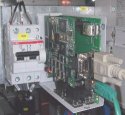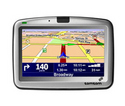LinuxDevices launches 2007 Embedded Linux survey
January 31, 2007 LinuxDevices.com today launches its seventh-annual Embedded Linux Market Survey, and invites all readers to participate. Don't miss this opportunity to help shape the industry in which you work, by answering 22 quick questions about developer preferences and industry trends. (more…)
LinuxDevices.com today launches its seventh-annual Embedded Linux Market Survey, and invites all readers to participate. Don't miss this opportunity to help shape the industry in which you work, by answering 22 quick questions about developer preferences and industry trends. (more…)
 The reviews are streaming are in. Three weeks after shipping, Nokia's second generation Linux-based Internet tablet, the N800, is being characterized as a flawed jewel by dozens of reviews in publications as diverse as BusinessWeek, OSNews, and MobileBurn.
The reviews are streaming are in. Three weeks after shipping, Nokia's second generation Linux-based Internet tablet, the N800, is being characterized as a flawed jewel by dozens of reviews in publications as diverse as BusinessWeek, OSNews, and MobileBurn.  Freescale has teamed up with Indesign on a hardware/software industrial POS (point-of-sales) device reference design. The design is based on 8- and 32-bit Freescale ColdFire processors, runs uClinux and other open source software, and targets high-security industrial system designs.
Freescale has teamed up with Indesign on a hardware/software industrial POS (point-of-sales) device reference design. The design is based on 8- and 32-bit Freescale ColdFire processors, runs uClinux and other open source software, and targets high-security industrial system designs.  Linux is among 15 featured technical tracks at this year's Embedded Systems Conference (ESC), Silicon Valley edition. Billed as “the world's largest international embedded technical conference and exhibition,” the event is set for Apr. 1-5 in San Jose, Calif.
Linux is among 15 featured technical tracks at this year's Embedded Systems Conference (ESC), Silicon Valley edition. Billed as “the world's largest international embedded technical conference and exhibition,” the event is set for Apr. 1-5 in San Jose, Calif.  An Italian electric power system manufacturer used embedded Linux as a key component of a system that performs remote sensing, data acquisition, and routing functions. RGM's AT91UL94 system runs Koan's KaeilOS on an ARM-based Atmel processor, and took six months to develop, according to Koan.
An Italian electric power system manufacturer used embedded Linux as a key component of a system that performs remote sensing, data acquisition, and routing functions. RGM's AT91UL94 system runs Koan's KaeilOS on an ARM-based Atmel processor, and took six months to develop, according to Koan.  A well-illustrated technical paper comparing RTLinux, RTAI, and VRTXsa has been published by two Italian computer science students. Emanuele Mattei and Andrea Ludiciani conclude that the RTOSes offer comparable predictability, while RTLinux is the least variable and RTAI the most efficient.
A well-illustrated technical paper comparing RTLinux, RTAI, and VRTXsa has been published by two Italian computer science students. Emanuele Mattei and Andrea Ludiciani conclude that the RTOSes offer comparable predictability, while RTLinux is the least variable and RTAI the most efficient.  American Arium is shipping a dot-revision to its hardware-assisted, Linux-aware debugging software for ARM, x86, and AMD64 processors. SourcePoint 6.3.1 adds better multi-threaded application debugging under Linux, a new project wizard, and faster load speed times for XScale processors, among other improvements.
American Arium is shipping a dot-revision to its hardware-assisted, Linux-aware debugging software for ARM, x86, and AMD64 processors. SourcePoint 6.3.1 adds better multi-threaded application debugging under Linux, a new project wizard, and faster load speed times for XScale processors, among other improvements.  A self-described “world famous celebrity hacker” has managed to boot uClinux on Sony's MIPS-based PSP (Playstation Portable). Chris Mulhearn's port so far lacks support for key PSP peripherals such as the screen, but could interest hackers able to connect serially to the PSP's “remote headphones” port.
A self-described “world famous celebrity hacker” has managed to boot uClinux on Sony's MIPS-based PSP (Playstation Portable). Chris Mulhearn's port so far lacks support for key PSP peripherals such as the screen, but could interest hackers able to connect serially to the PSP's “remote headphones” port.  In what appears to be a twist on the conventional wisdom that Windows systems are more vulnerable to viruses than Linux systems, some of TomTom's GPS navigation gadgets appear to have infected Windows PCs with a “low risk” virus.
In what appears to be a twist on the conventional wisdom that Windows systems are more vulnerable to viruses than Linux systems, some of TomTom's GPS navigation gadgets appear to have infected Windows PCs with a “low risk” virus.